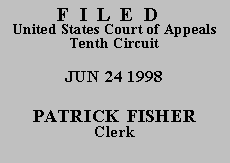

| AMEER LABEEB HASSAN,
v.
MICHAEL O. LEAVITT, Governor,
State of Utah |
No. 97-4001
(D.C. No. 95-CV-527)
(D. Utah)
|
Background
Ameer Labeeb Hassan filed his civil rights complaint pro se and in forma pauperis (IFP) under 42 U.S.C. § 1983, alleging violations of RFRA, as well as 42 U.S.C. §§ 1985 & 1986. Hassan also brought constitutional claims for violations of the First Amendment's free exercise clause and the Fourteenth Amendment's due process and equal protection clauses. (See R., Doc. #3, Amended Compl., at 8-10.) Hassan sought money damages, injunctive relief, and a declaratory judgment. (See id. at 11-12; R., Doc. #2, Compl., at 13-16.)
Hassan's suit arises out of events that he alleges began when he returned to the Utah State Prison after a parole violation in 1994. According to Hassan's complaint, prison officials confiscated Hassan's personal collection of religious books and materials during Hassan's in-take processing. (See R., Doc. #2, at 9, ¶¶ 41-42.) Hassan also alleges that no prison chaplain was present during his in-take processing, which he claims was a violation of the prison's regulations ensuring the protection of religious practices. (See id. at 9, ¶ 43.)
The magistrate judge recommended that Hassan's religious free exercise claims be dismissed because his complaint "fail[s] to assert facts which demonstrate a 'substantial burden'" on his religious practices, as required by RFRA. (See R., Doc. #9, Report & Recommendation, at 9.) The magistrate also recommended that all of Hassan's other claims be dismissed because of the inadequacy of his pleadings. (See id. at 9-16.) Hassan filed a lengthy Notice of Objections to the magistrate judge's report, (see R., Doc. #10), but the district court adopted the magistrate judge's report without revision, (see R., Doc. #12). The court found that Hassan's complaint "lacks an arguable basis in law or fact" and ordered Hassan's suit dismissed without prejudice under Fed. R. Civ. P. 4(m). (See id.)
Following the district court's denial of Hassan's motion to amend or vacate its order, Hassan filed a timely notice of appeal. (See R., Doc. #13, 15, 16.) Hassan now raises three issues: 1) Whether the state's repeal of its various prison regulations dealing with religious accommodations was arbitrary and capricious; 2) Whether Hassan's complaint stated a cause of action under the RFRA; and 3) Whether "First Amendment rights are preferred." (See Aplt. Br. at 15.)
Discussion
When a district court finds that an IFP complaint lacks an arguable basis in fact or law, i.e., that it is frivolous, we review the district court's dismissal for an abuse of discretion. See Schlicher v. Thomas, 111 F.3d 777, 779 (10th Cir. 1997). However, in this case, we need not address the particular findings of the district court and the magistrate judge because recent decisions have rendered Hassan's appeal groundless.
In City of Boerne v. Flores, 117 S. Ct. 2157, 2172 (1997), the Supreme Court held that Congress exceeded its authority under section 5 of the Fourteenth Amendment when it enacted the "substantial burden" and "compelling interest" test of RFRA. The Court held that Congress has no power under the Fourteenth Amendment to declare the substantive scope of the First Amendment right of the free exercise of religion. See id. at 2164. Instead, the scope of that right is determined by the Supreme Court's own interpretations. See id. at 2172.
The effect of Boerne essentially was to declare RFRA invalid, at least as far as it applied to the states, and to resuscitate the Supreme Court's prior doctrine for the substantive scope of the free exercise clause. See Freeman v. Arpaio, 125 F.3d 732, 736 (9th Cir. 1997). As a result, Hassan's appellate argument that his complaint stated a valid cause of action under RFRA is moot.
As for Hassan's argument that the state of Utah acted arbitrarily and capriciously when it repealed certain prison regulations dealing with religious accommodation, we note that this issue was not raised or decided below. As a result, it is not properly before us, and we decline to express an opinion on this issue. See Walker v. Mather, 959 F.2d 894, 896 (10th Cir. 1992) (holding that issues not raised below will not be considered on appeal).
Finally, as for Hassan's claim that "First Amendment rights are preferred," we find this issue entirely frivolous. Innumerable cases by the Supreme Court and lower courts have declared that protection of First Amendment rights is fundamental to the essence of our Republic. See, e.g., Church of the Lukumi Babalu Aye, Inc. v. City of Hialeah, 508 U.S. 520, 523 (1993) (striking down city ordinances because they "violated the Nation's essential commitment to religious freedom"). Yet, Hassan has utterly failed to show how our judicial reaffirmation of this principle would remedy any of his alleged injuries. Because the federal courts are constitutionally prohibited from rendering advisory opinions, we decline Hassan's invitation to expound on the verities of the First Amendment.
For the foregoing reasons, we AFFIRM.
The mandate shall issue forthwith.
ENTERED FOR THE COURT
David M. Ebel
Circuit Judge
*.After examining the briefs and appellate record, this panel has determined unanimously to grant the parties' request for a decision on the briefs without oral argument. See Fed. R. App. P. 34(f) and 10th Cir. R. 34.1.9. The case is therefore ordered submitted without oral argument. This Order and Judgment is not binding precedent, except under the doctrines of law of the case, res judicata, and collateral estoppel. The court generally disfavors the citation of orders and judgments; nevertheless, an order and judgment may be cited under the terms and conditions of 10th Cir. R. 36.3.